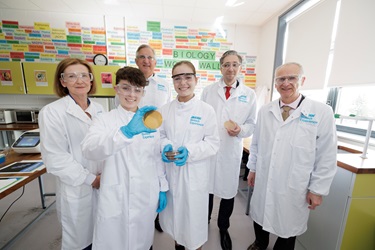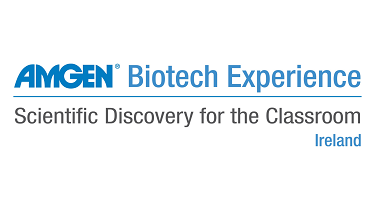SBI's Cormac Taylor to Receive Prestigious US Award
The American Physiological Society (APS) has announced that Professor Cormac Taylor, a leading UCD research and PI at SBI, is to be presented with the 2017 Takeda Distinguished Research Award by the Society’s Gastrointestinal and Liver Physiology Section.
The prestigious award is presented annually to an outstanding investigator who is internationally recognised for his/her contribution to physiological research in these areas. This is the first time that this award will be presented to a scientist located outside the United States since it was established in 2007.
The announcement of the Award to Professor Taylor, Professor of Cellular Physiology at the UCD School of Medicine, was made at the 2016 APS Experimental Biology meeting held in San Diego. The award will be presented to Professor Taylor at the 2017 meeting to be held in Chicago.
Physiology is the study of how molecules, cells, tissues and organs function in health and disease. Established in 1887, the APS was the first US society in the biomedical sciences field. The Society currently represents more than 11,000 members and publishes 14 peer-reviewed journals with a worldwide readership.
UCD’s Professor Cormac Taylor said, “I am delighted and honoured with the announcement that I am to be the recipient of the 2017 Takeda Distinguished Researcher Award. This honour is a testament to the hard work of all of the PhD students and postdocs who have trained over the years in my lab at University College Dublin. I believe that the award underscores the importance of investigator-led basic research in medicine."
Professor Taylor leads a research group at the UCD Conway Institute investigating the mechanisms by which epithelial cells respond to low oxygen levels (hypoxia). The group explores the regulation of gene expression in hypoxic conditions and the potential of targeting of oxygen-sensitive cellular pathways in inflammation as a means of treating conditions such as inflammatory bowel disease (IBD).
Professor Orla Feely, UCD Vice-President for Research, Innovation and Impact said, “I would like to congratulate Professor Cormac Taylor on the announcement by the American Physiological Society that he is to receive the 2017 Takeda Distinguished Research Award. This Award to Professor Taylor demonstrates the quality and impact of his research carried at University College Dublin in one of our key strategic research areas, health.”
She added, “Professor Taylor’s research into the cellular response to hypoxia has revealed novel mechanisms whereby protective endogenous processes can be exploited for therapeutic gain in the context of prevalent chronic inflammatory disease.”
Dr Declan F. McCole, Chair, APS Gastrointestinal and Liver Section said,“Professor Taylor is very highly regarded within the gastrointestinal research community for his work on the roles of hypoxia in intestinal inflammation. He has generated very important insights in this field and thus is an extremely worthy winner of the 2017 Takeda Distinguished Research Award. He is also well known for being a vocal supporter of the broader mission of the American Physiological Society.”
In 2014, Professor Taylor, a member of the Royal Irish Academy, was recognised for outstanding scientific mentorship with the 2014 Nature Award for Mentoring in Science.
For further information contact Micéal Whelan, University College Dublin, Communications Manager (Innovation), e: miceal.whelan@ucd.ie, t: + 353 1 716 3712.
Editor’s Notes
The American Physiological Society (APS) is a non-profit devoted to fostering education, scientific research, and dissemination of information in the physiological sciences. The Society was founded in 1887 with 28 members. APS now has over 11,000 members. Most members have doctoral degrees in physiology and/or medicine (or other health professions).
APS is governed by an elected Council consisting of a President, President-Elect, Past President, and nine Councillors. The National headquarters of the Society is based in Bethesda, Maryland, on the campus of the Federation of American Societies for Experimental Biology (FASEB). APS is a member of the Federation of American Societies for Experimental Biology (FASEB), a coalition of 26 independent societies that plays an active role in lobbying for the interests of biomedical scientists. www.the-aps.org/
Professor Cormac Taylor has supervised 16 PhD students and published over 100 articles, accumulating in excess of 8,000 citations and achieving a h-factor of 44. He has maintained continuous funding through the Science Foundation Ireland investigator award programme since 2002 and has held career development awards from the Wellcome Trust and the National Institutes of Health (USA). After obtaining his PhD in pharmacology from the UCD in 1996, Professor Taylor undertook a research fellowship in Harvard Medical School at the Brigham & Women’s Hospital. He returned to Ireland in 2001 when he was appointed College Lecturer in the UCD School of Medicine and established an independent research group at the UCD Conway Institute. www.ucd.ie/research/people/medicine/professorcormactaylor/

